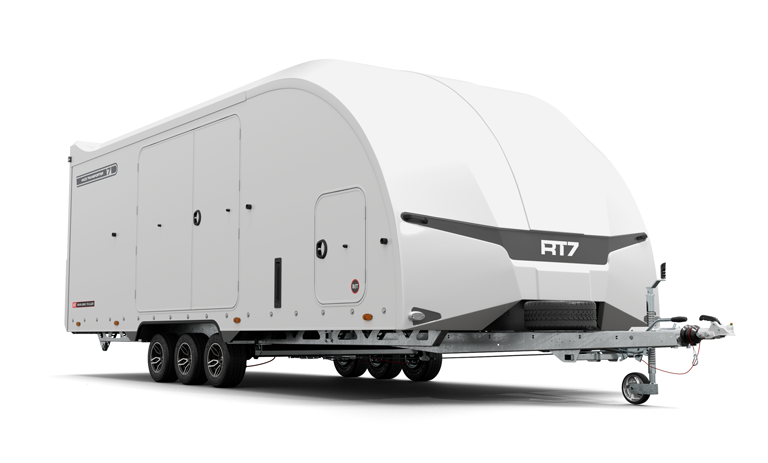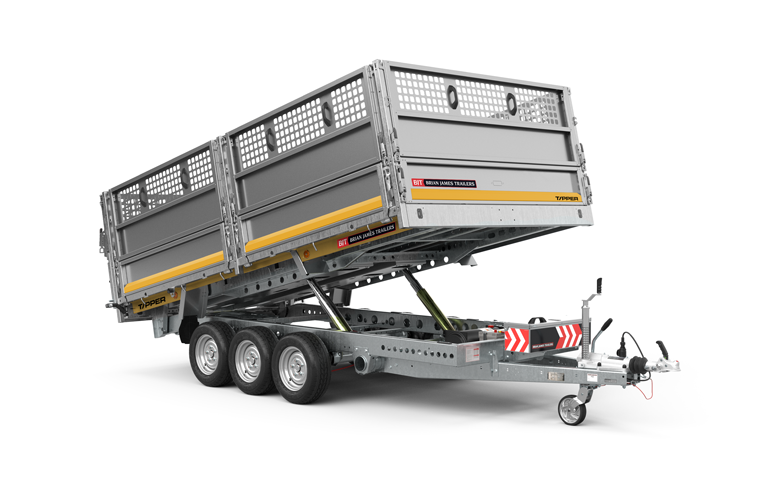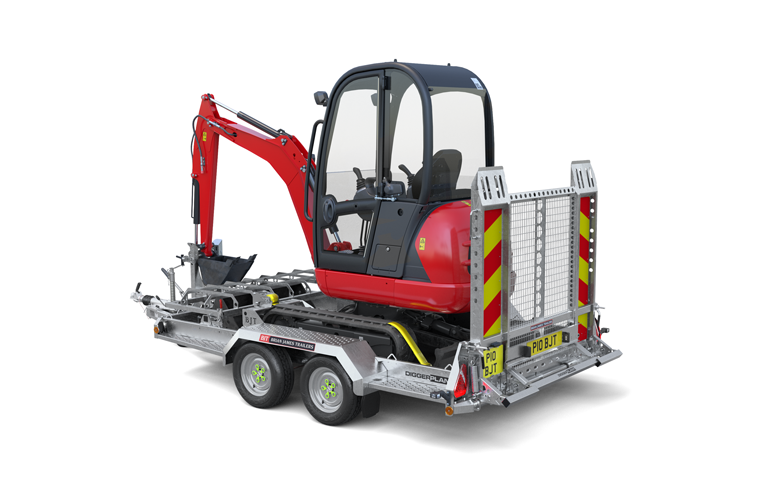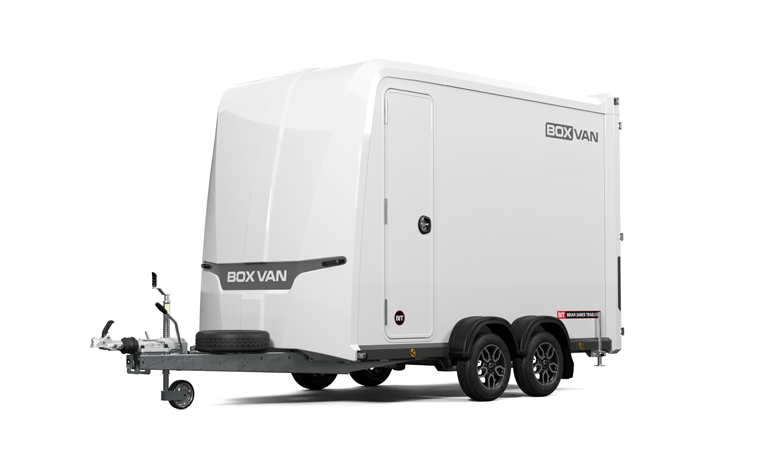Limiti di peso del rimorchio e capacità di traino

Knowing and adhering to trailer weight limits and towing capacities is essential for safe, effective, and legal towing. Understanding these critical factors ensures the safety of drivers, passengers, and cargo while preventing damage to vehicles and trailers.
As a class-leading UK trailer manufacturer, we are passionate about precision and safety in trailer manufacturing, offering a range of premium trailers designed to meet your specific needs. So, in this guide, we will walk you through everything you need to know about trailer weights and towing capacities, so you can tow with confidence.
The following guide applies to people who are using a trailer for recreational as opposed to professional use. If you are using a trailer for professional use - or hire and reward as it is referred to - you will quite probably need a tachograph and possibly additional licences. For usage that does not fall in the ‘hire and reward’ category, there are still rules that apply to both the trailer and its load, as well as the vehicle that tows it.
This blog is a guide based on UK regulations. Towing weight restrictions, vehicle dimensional limits and driving license requirements may vary internationally. Always check the local regulations in the country you plan to tow in, to ensure compliance.
Key Concepts in Trailer Weights
Before you invest in a trailer, you need to check that the tow vehicle you intend to use is legally allowed to tow it. With a few exceptions for small cars that are not permitted to have tow bars fitted, all vehicles will have a maximum weight that they can tow.
The heavier the trailer, the more powerful a tow vehicle is needed. So, let us get up to speed.
(Further information and guidance can be found on the NTTA website)
Towing Capacity Defined
Every car has a maximum weight it can legally tow, known as its towing capacity. This information can often be found in the V5C logbook, or on a plate / sticker located on the vehicle itself. You can also find the towing capacity in the vehicle’s handbook.
In the UK, and other European countries, the maximum towing capacity is 3500kg. However, only a few non-commercial vehicles are legally allowed to tow that weight.
It's also important to account for the gross vehicle weight (GVW) of your trailer, which is the combined weight of the trailer and its load. For instance, if a trailer has an GVW of 3,500kg and the trailer itself weighs 1,000kg, it can carry a load of up to 2,500kg.
Weight Ratings
Weight ratings are critical to ensure safety, optimal performance, and compliance with legal requirements. Feeling confused by all the different weight terms for vehicles and trailers? Here is a table of key terminology and what they all mean.
| Weight Term | Definition |
|---|---|
| Unladen Weight | The weight of the vehicle or trailer when it is not carrying any persons, goods, or items |
| Gross Vehicle Weight (GVW) | The total weight of the trailer when fully loaded, including the cargo |
| Load Capacity | The total weight a trailer can carry |
The Importance of Nose Weight
Another important factor to consider is nose weight, also known as tongue weight. This is the weight the trailer's tow hitch places on the towing vehicle's tow ball. There must always be positive weight pushing down on the tow ball and this is usually determined by the positioning of the trailer's load. (See diagram).
Getting the trailer nose weight just right is key to ensuring a safe towing experience. If the nose weight is too light, or too far back, the trailer might sway side to side, making it harder to control. On the other hand, if the nose weight is too heavy, it can overload the rear tires of your tow vehicle and cause the back end to shift unpredictably. The nose weight must also be within the legal limits of the trailer.
Imbalance can also impact your vehicle’s handling, making it difficult to navigate corners and curves safely, and it may increase your stopping distance, reducing your ability to brake effectively when needed. This is why understanding how to properly load and balance your trailer is so vital for safe towing.
It is important to ensure that the nose weight falls within the legal requirements of the trailer. For example, a Brian James Trailer with a Gross Vehicle Weight of 3,500kg, has a nose weight limit of 150kg. Whereas, all BJT models with a gross vehicle weight of less than 3,500kg, have a maximum nose weight allowed of 100kg.
Always refer to your manufacturer’s manual, trailer VIN plate, or consult your local dealer for specific guidance.
Make Sure You Can Tow on Your Driving Licence
It is not just your vehicle and trailer that defines your towing capacity. UK driving licences determine the types of trailers you, as an individual, can tow. So, it is always important to check your licence before you invest in a trailer, and hit the road.
Passed Before or On 1 January 1997
If you passed your car driving test before 1 January 1997, you are allowed to:
- Drive a vehicle and trailer combination with a maximum authorised mass (MAM) of up to 8,250kg. You can check your driving licence details for confirmation.
- Tow a trailer over 750kg MAM with a minibus.
To drive a vehicle and trailer combination exceeding 8,250kg, you will need to take an additional car and trailer driving test.
Passed On or After 1 January 1997
If you passed your car driving test on or after 1 January 1997, you are permitted to:
- Drive a car or van with a maximum authorised mass (MAM) of up to 3,500kg.
- Tow a trailer over 750kg MAM, provided the combined MAM does not exceed 3,500kg.
For caravan drivers, the combined MAM of your car and caravan will likely exceed 3,500kg. If this applies to you, you will need to pass the car and trailer driving test before towing a caravan.
Legal Regulations and Compliance
Refer to the UK Government's guidelines for towing weight and width limits:
- Maximum trailer width: 2.55m.
- Maximum trailer length: 7m for a vehicle’s GVW up to 3,500 kg.
Types of Trailers
Brian James Trailers offers a variety of high-quality trailers designed for specific purposes, be it personal, commercial, or construction use. The configurator tool on our product pages adjusts the maximum load when you add accessories, so you can get an indication of the maximum load depending on the options you specify.

Car Trailers
Whether you are transporting classic cars, race cars, or everyday vehicles, Brian James Trailers provides a range of open car transporters and enclosed car transporters that blend innovation, quality, and lasting value.
Our car trailers come with a high standard of features and can be configured with various options to suit your specific needs, including winches and tilt-bed designed for easy loading. They are also available in a variety of colours.

Tipper Trailers
The Brian James Trailers Tipper is packed with industry-leading features, including our 'Click & Clamp' system with auto-adjusting posts and locking clamps for easy, rattle-free side fittings. It also includes a battery trickle charger, side extensions, and much more. Ideal for utility and landscaping tasks.

Plant Trailers
Our range of plant trailers are designed for heavy equipment in construction, with the capacity to transport mini-diggers, access platforms, and other plant and machinery. All our trailers come with a 5 Year Warranty on all BJT manufactured parts including the chassis.

Box Van Trailers
Our range of box van trailers features an innovative multi-function split rear door, which can fully fold back against the trailer body, function as a ramp, or a combination of both. Available in black or white, they offer a wide range of customisation options to suit your needs.
Find Your Ideal Trailer with Brian James Trailers
Brian James Trailers combine innovation, quality, and customisation to deliver trailers tailored to your needs. Explore our product range or consult with our experts to find the perfect trailer for your towing requirements.
Disclaimer: The information in this guide is intended as a guide. It is as accurate at the time of publication as the editor is able to make it. Neither the Editor nor Brian James Trailers nor any other person or company associated with the production of this guide accepts any responsibility for any inaccuracies which may be in the text.
It is the responsibility of any person wishing to depend on the facts contained in this article to check for themselves with original documentation or any updating regulations, instruments or changes in the law.
